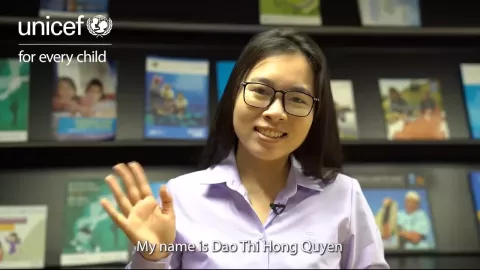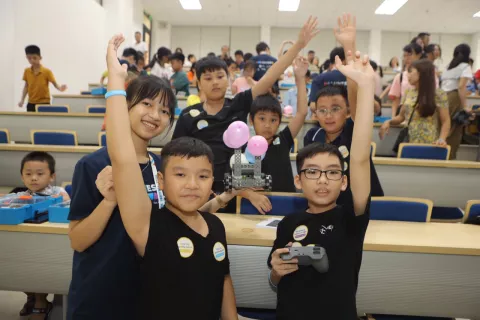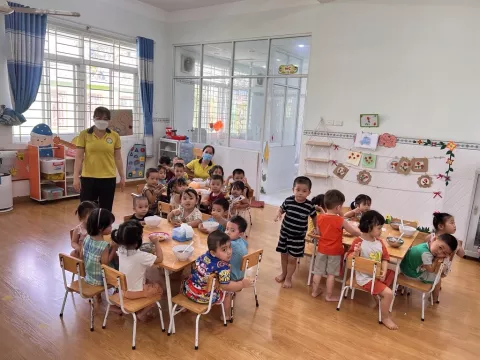Call for Expressions of Interest for potential partnerships with UNICEF Viet Nam
“Inclusive, equitable and gender responsive digital innovation in education”
The purpose of this Call for Expressions of Interest (EOI) is to identify eligible Civil Society Organizations (CSOs) for potential partnerships with UNICEF Viet Nam to support achievement of results for children outlined in the 2022-2026 Country Program and the inclusive, equitable and gender responsive approach to digital transformation in education (section 1.4 below).
Organizations that wish to participate in this expression of interest are requested to:
-
Register themselves in the UN Partner Portal;
-
Send a technical proposal marked “CSOs Expression of Interest: inclusive, equitable and gender responsive digital innovation in education” to the following address: lalan@unicef.org by 4th July 2022 (copy: tngothuyanh@unicef.org)
CSOs can only submit their interest as individual entities. Applications must be submitted in English.
Any requests for additional information should be addressed in writing by 28th June 2022 to tngothuyanh@unicef.org (copy: lalan@unicef.org). UNICEF responses to any queries or clarification requests will be made available to all online before the deadline for submission of applications.
The selection of a partner is a competitive process and will be based on the criteria provided in the call for EOI. Applications will be assessed by an evaluation committee to identify CSOs that have the mandate, capacity, and comparative advantages to support the achievement of results for children using the criteria outlined in the call for EOI.
Applications will be assessed by an evaluation committee to identify CSOs that have the mandate, capacities, and comparative advantage to support achievement of results for children using criteria outlined in section 3 below. It should be noted however that participation to this Call for Expression of Interest does not guarantee the CSO will be selected for partnership with UNICEF. Selected NGOs will be invited to review and finalise partnership agreements in accordance with criteria outlined in section
3.4 below and applicable policy and procedures in partnership with CSOs.
Applicant CSOs will be informed of the outcome of their submissions by communication sent out to the email that is indicated in the CSO submission.
|
Section 1: Background |
|
|
1.1 UNICEF mandate |
UNICEF is the agency of the United Nations mandated to advocate for the protection of children's rights, to help meet their basic needs and to expand their opportunities to reach their full potential. |
|
1.2 UNICEF Programme of Cooperation in Viet Nam |
In Viet Nam, UNICEF works with the government and other partners to support the acceleration of child rights realization to ensure that no child is left behind. Equity is at the core of the country program, which advances the inclusion of the most disadvantaged and marginalized populations, especially ethnic minorities and children with disabilities. Further information on the program can be found on https://www.unicef.org/vietnam/ |
|
1.3 Background |
Equity is at the core of the Education programmes in UNICEF Viet Nam. We work with governmental and non-governmental organizations and focus our support on the most vulnerable and disadvantaged populations including children and adolescents from impoverished households, children with disabilities, ethnic minority girls and boys, those living in remote areas or in industrial zones, adolescents who identify themselves as LGBTIQ+ and those children and adolescents most exposed to environmental degradation and disaster risks. Our 2022 – 2026 Education Program aims that:
UNICEF Viet Nam also supports the government in the digital transformation of the education system, to ensure each and every child has access to affordable, gender- responsive and inclusive opportunities for learning and development. We supported the Ministry of Education and Training (MOET) in developing a national framework for digital literacy and transferable skills for teachers and students. The framework sets the competency standards and promotes digital literacy and transferable/life skills curriculum from preschool up to secondary school levels. It was finalized and disseminated in 2021 with subsequent training of trainers (ToT) conducted to equip teachers with the skills and knowledge needed to facilitate digital teaching and learning. UNICEF Viet Nam is developing, testing and institutionalizing technology-based innovation at all school levels to empower and support teachers with new approaches to personalized and digital learning solutions, and with measurable impact on learning outcomes. In line with the Reimagine Education initiative, the Digital Public Goods Alliance, and other relevant strategies such as GIGA, we also aim to improve access to devices, connectivity, affordable data and content, and to platforms that facilitate child and adolescent socio-emotional learning, skills development, collaboration and engagement. Data security and privacy and digital wellbeing are top priorities in these processes. UNICEF Viet Nam facilitates quality and inclusive learning for children with disabilities, both via the provincial Inclusive Education Resource Centers and also via regular schools to build capacity of teachers in inclusive instruction and assertive digital learning skills. We are also advocating for digital accessibility and equity and to include children and people with visible and invisible disabilities, girls, and ethnic minorities throughout every steps, from the design process, to testing, adapting and finalizing the platforms and solutions for education. UNICEF Viet Nam will utilize the lessons learned and evidence from field implementation to influence the government in the area of skills development, including digital literacy, transferable skills and environment and climate change, especially to reach the most vulnerable adolescent girls and boys (including those with disabilities) in both urban and rural settings. This will include innovating with and for adolescents to develop solutions that can be implemented at scale. The digital transformation requires new ways of thinking, the adoption of innovative approaches, and establishing strong synergy between CSOs, the private sector and Government counterparts. We therefore seek to leverage our partnerships with CSOs with expertise and proven capabilities in the areas outlined in 1.4 below. Our focus is in (but not limited to) these locations: Lao Cai, Ninh Thuan, An Giang, Dong Thap, Kon Tum, Soc Trang, Da Nang, and Ho Chi Minh City. |
| 1.4 Areas of partnership and expected results |
Area 1: Digital literacy, transferable skills, green skills and STEM pathway Vulnerable and marginalized children, regardless of gender and ability, are provided with gender-responsive, inclusive, and stimulating learning environments. They are empowered to learn-by-doing and develop digital, transferable skills and green skills by directly engaging with their STEM education through innovative, inclusive approaches and immersive interactive experiences. Children and young people are encouraged to overcome gender norms and stereotypes and are encouraged to pursue their interests in STEM subjects and careers. Teachers have improved digital literacy skills and innovative teaching practices and are able to consciously tackle gender norms and stereotypes to encourage students’ interests in STEM subjects and careers, regardless of gender. Parents engage more effectively in the digital learning journey of their children. Area 2: Online safety, digital wellbeing, and media literacy Children and young people, teachers and parents can self-govern their online safety, mental health and well-being while consciously using tech tools. They are also empowered to think critically about different media sources and the use of digital tools. Area 3: Digital accessibility and inclusion Those who are involved in building educational resources and platforms are aware of digital accessibility and actively working towards removing the barriers of access to digital tools and contents. Children and people with visible and invisible disabilities, and from ethnic minorities are involved throughout the building concepts and design processes, testing, adapting and finalising the resources, platforms and solutions for education. Children regardless of social backgrounds and abilities have equal access to digital devices, the internet, other information, and communication technology (ICT), learning and vocational training resources. Children and parents from underserved ethnic groups are supported with innovative approaches in mother-tongue based bilingual education, especially the early intervention for preschool children. Area 4: Digital Public Goods Tools and resources required to implement and build open-source solutions in alignment with the DPG Standard are readily available through working with open source, open content, and open data communities. Increase the local capacity for the creation of new Digital Public Goods. Useful Digital Public Goods (DPGs) from the DPG registry are adopted and adapted locally. Local solutions meeting the DPG standard, helping to achieve Sustainable Development Goals (SDGs) are identified and nominated to the DPG Alliance. |
|
Section 2: Application requirements and timelines |
||
|
2.1 Documentation required for the submission |
The expression of interest shall include the following documentation:
1.4 above. However, a maximum of 1 proposal per result area may be submitted by the same CSO, with a maximum of 4 proposals per CSO applicant. |
|
|
2.1 Indicative timelines |
Call for Expression of Interest issue date |
21st June 2022 |
| Deadline for submissions of CSO proposals | 4th July 2022 | |
| Deadline for requests of additional information/ clarifications | 28th June 2022 | |
| Review of CSO submissions | 4th July 2022 | |
| Notification of results communicated to CSO | 15th July 2022 |
|
Section 3: Process and timelines |
|||||||
|
3.1 Review & evaluation of CSO submissions |
CSO submissions are assessed by the Partnership Review Committee in consultation with technical specialists, using criteria outlined in section 3.2 and 3.3 below. Only CSO submissions which comply with the requirements of the eligibility and exclusion criteria will be eligible for further evaluation. Results from the review will be used for purposes of mapping and selection of CSOs in relation to the specific results outlined in section 1.4 above. It should be noted that participation to this Call for Expression of Interest however does not guarantee CSOs will be ultimately selected for a partnership agreement with UNICEF. UNICEF reserves the right to invite selected partners to review and finalise proposals for partnerships in line with criteria outlined in section 3.4 below and in accordance with applicable policy and procedures on partnership with CSOs. |
||||||
| 3.2 Eligibility & exclusion criteria |
CSO must:
CSO submission which:
will be excluded from the selection process. |
||||||
| 3.3 Selection criteria |
UNICEF office will review evidence provided by the CSO submission and assess applications based on the following criteria:
|
||||||
| 3.4 Prospective partnership agreement |
All applicants will be informed of the outcome of their submissions by communication sent out to the email/ postal address that is indicated in the CSO submission. Applicants whose proposals are assessed as having a specific comparative advantage to achieve results for children outlined in 1.4 above may be invited to jointly review and finalise the partnership agreement based on the following criteria:
Upon finalisation at the technical level, the proposal for partnership will be submitted to the Representative for review and approval. It should be noted however that the Representative has the final authority to approve or reject any proposed partnership agreement on behalf of UNICEF. |
Please complete the attachments sent with this document
- Attachment I – CSO Identification Profile (to be completed by CSO Applicant)
- Attachment II – Programme Proposal (to be completed by CSO Applicant)
Q&A
1. What is the estimated limit budget for this each proposal?
Minimum of USD100,000 and maximum of USD400,000 for all four areas.
2. How long is the project and how long is the programming proposal for?
The whole programming period is from 2022 to 2026. The CSO’s proposals are expected for the period of 2 years within this period.
3. Can one proposal cover different areas of result?
Yes.
4. In the Attachment II, Section 3 Programme work plan and budget, what is “HQ costs” and “HQ technical support”?
Headquarters Support Costs are paid to international CSO whose headquarters is outside of the country of implementation when requested by the partner. International CSOs often incur additional costs at their headquarters for overseeing and supporting programme implementation.
Headquarters Support Costs are included in the programme document as a standard, flat 7 per cent addition to the cash transfer component (i.e. excluding supplies, equipment and other forms of in-kind support) of the agreed budget of UNICEF Programme Costs. This excludes the value of cash/voucher assistance for beneficiaries and bulk procurement such as essential supplies, construction materials, or sub-contracting for commercial services exceeding USD 100,000 in each activity.
5. Would this program accommodate personnel and other direct costs of CSO participants?
As this is a partnership between two sides, we expect the interested partner will cover these costs.
6. What are the locations for the programming proposal?
We are prioritizing the programs in these locations: Lao Cai, Ninh Thuan, An Giang, Dong Thap, Kon Tum, Soc Trang, Da Nang, and Ho Chi Minh City. However, we also welcome proposals for other locations if they directly support the achievement of our expected results in section 1.4.
7. Can our projects be implemented in cooperation with government partners and/or private sector partners?
Yes
8. Any recommendation on CSO’s budget contribution ratio?
We recommend a minimum 10% of the total proposed budget for programme activities.




